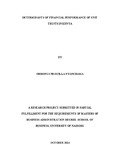| dc.description.abstract | This study was aimed at identifying the determinants of financial performance of unit
trusts in Kenya. A unit trust is an arrangement whereby property (shares, bonds and
real estate) is held on trust for a large number of investors. This makes unit trust funds
the ideal alternative, providing cost effective access to a wide variety of local and
international shares or equities (companies listed on a stock exchange), bonds, and
money market instruments such as fixed deposits, treasury bills and call accounts. This
study utilized secondary data; which was from the annual reports of the unit trusts
studied for the period between years 2008 to 2012. The NSE 20 share index was used
in estimating the performance of unit trusts where by each unit trust performance was
indicated in a percentage of the market Rate of Return. NSE provided rates of returns
over the five year period to show performance distribution of the unit trusts. The study
focused on registered unit trusts in Kenya from January 2008 to December 2012 with
money markets, equity, fixed income, bond, growth, and balanced funds categories.
In the analysis of determinants of financial performance of unit trusts in Kenya; fund
size, expense ratio, equity fund allocation ratio, fund type, diversification of funds and
the minimum investment amount were taken into account. Both dependent and
independent variables were analyzed using Jensen’s Alpha model where by the alphas
and betas computed from various rates of return; market rate of return, rates of return
for funds taken into consideration and Risk Free Rate of Return for the various periods
were used as constants. The findings of the study showed that size of fund is a critical
determinant of performance of unit trusts. As funds grow in size, they tend to become
more efficient in their operations. The study also found out that expense ratio an
equity fund allocation ratio have no influence on fund performance of unit trusts.
Diversification of funds and minimum investment amount were found to be having an
impact on overall fund performance of unit trusts in Kenya.
As per the study findings, the coefficient of determination value was 0.6534
significant. This indicates that 65.34% variation in determinants of financial
performance of unit trusts in Kenya that is explained by variation of independent
variables. Therefore, the other factors, which are not studied, contribute to the
remaining 34.66%. The researcher therefore recommends more studies to be carried
on unit trusts. Since the study was limited to internal factors, other studies should be
done targeting economic factors such as general availability of credit, national
disposable income, prosperity of people to spend, interest rates, inflation rates and
trends in growth of Gross National product (GNP). | en_US |

